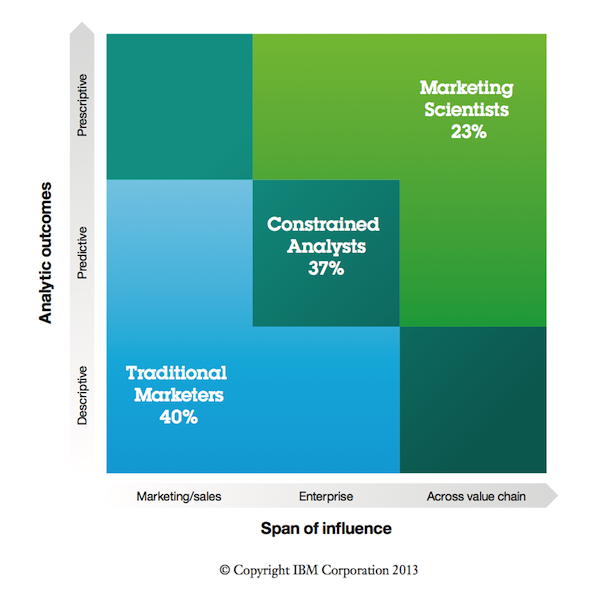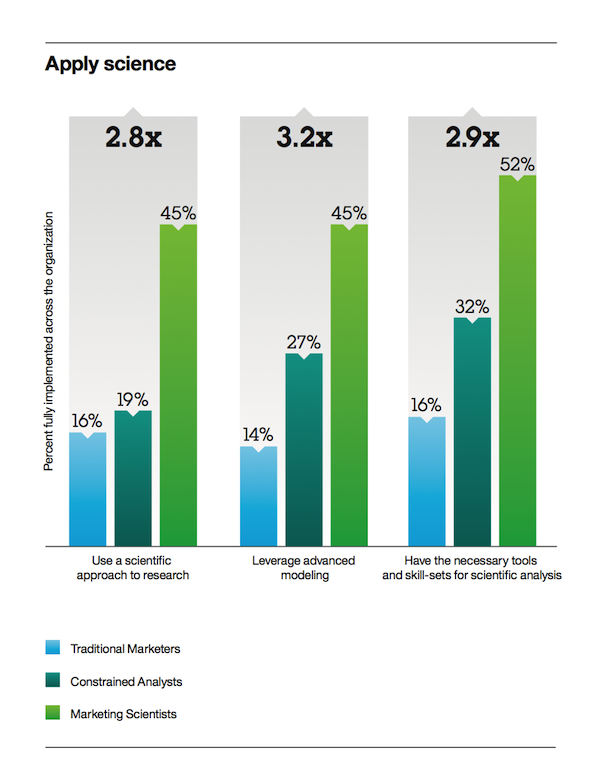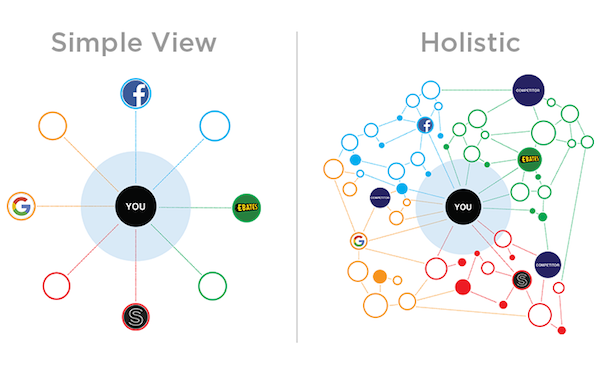If I were a marketer psychologist — that is, a therapist to marketing teams, for which I’m sure there’s a market — I could imagine making a fine living by asking open-ended questions, such as “What does marketing science mean to you?”, and holding up a mirror to people’s responses.
I hear you say data-driven. What’s your earliest memory of working with data?
“Marketing as a science” strikes me as a bit of a Rorschach test for marketers these days. The answers seem to vary tremendously, offering glimpses into an organization’s worldview and culture in our digitized and data-ified world. (To play fair, last month I wrote up my interpretation of that nomenclature inkblot by describing 4 principles of good marketing science.)
So I’ve been eagerly consuming content, wherever I can find it, that champions science in marketing, to appreciate the different perspectives people bring to that concept. The latest piece I’ve read is a new IBM report, Marketing science: From descriptive to prescriptive.
IBM surveyed 358 marketers, across a range of businesses and industries, to examine how they’re using data and scientific methods to impact business outcomes. In the graphic at the top of this post, they classified participants according to (Y-Axis) whether their analytic outcomes were descriptive, predictive, or prescriptive and (X-Axis) whether the influence of their analytical methods spanned marketing/sales, the whole enterprise, or across the entire value chain.
They labeled as “marketing scientists” those who combine predictive or prescriptive analytical outcomes with influence across the enterprise or the entire value chain. Only 23% of those surveyed qualified for the marketing scientist label.
Of course, one doesn’t need to qualify for their definition of a “marketing scientist” in order to be effective at using science in marketing. In fact, later on in the paper, IBM separately analyzes the results of marketers who report how well they apply science in their work. But what’s interesting is that those participants who did cluster into the marketing scientist category had a much higher propensity than “traditional marketers” or “constrained analysts” to use a scientific approach in general:
In other words, there is a strong correlation between those marketers who embrace more advanced techniques (such as prescriptive analytics) and influence across the value chain of the organization with those who are generally more “scientific” in their approach, presumedly even in simpler scenarios.
That makes sense, although — as data science says — correlation does not imply causation.
I add that caveat, because while I appreciate the capabilities of prescriptive analytics and optimization across the entire value chain, I don’t believe that either of those is necessarily a requirement for applying good science in marketing.
There are plenty of opportunities just within marketing/sales for better data-driven decision making and controlled experimentation that can generate terrific returns. I’d caution against setting the bar so high that people are discouraged from more modest marketing science.
I had the chance to talk with Derek Franks, a consultant for the IBM Center for Applied Insights and one of the authors of the report, who confirmed that testing hypotheses and running controlled experiments was, by far, “the most important step.”
“Start by conducting relatively small scale experiments,” Derek suggested. “Develop a hypothesis, test it, and modify it. That approach is much better than randomly walking around, looking for patterns in the data.”
I also asked him about the limits of prescriptive analytics in marketing science. Prescriptive analytics, as written on Wikipedia, automatically synthesizes big data, mathematical sciences, business rules, and machine learning to make predictions and then suggests decision options to take advantage of the predictions. It is the so-called “third phase” of business analytics which includes descriptive, predictive and prescriptive analytics.
While there are certainly scenarios where prescriptive analytics can be effective, I am a little concerned about the risk of overreaching with such techniques. After all, predicting the future is hard, especially when complexities of markets and human behavior are involved. How should marketers manage that?
“The biggest defense against this,” Derek replied, “is having marketing scientists, data scientists within your organization who really understand what they’re doing. They understand the limits of the data that they have access to and are careful to qualify what they can predict with a certain percentage of confidence.”
That’s fair. But I think it’s also important for marketing executives to calibrate realistic expectations. As Derek mentioned in our chat, “Not everyone needs to become a data scientist. But business executives need to be intelligent consumers of data.”
In my opinion, intelligent consumers of data are open-minded, curious, and willing to look at data through more than one lens. They value analytical decision making. But they also bring a healthy skepticism to the limits of the data they’re working with. Finding the right balance between data-driven and experience-driven management may be a big part of where the “art” of marketing still remains.
“The science of marketing isn’t going to replace the art of marketing,” Derek added at the end. “It will enhance the art of marketing. It’s not an either/or proposition at all, but rather complementary approaches.”
What does marketing as a science mean to you?





as usual an veey compelling post. I wnture to guess that many who “get it” are held back by access to data, tools, and confidence to deploy…
Good thoughts Scott.
This is timely, I just met someone today predicting the “end of marketing” due to the rise of data. Which sounds insane… but I’ve been wrong before.